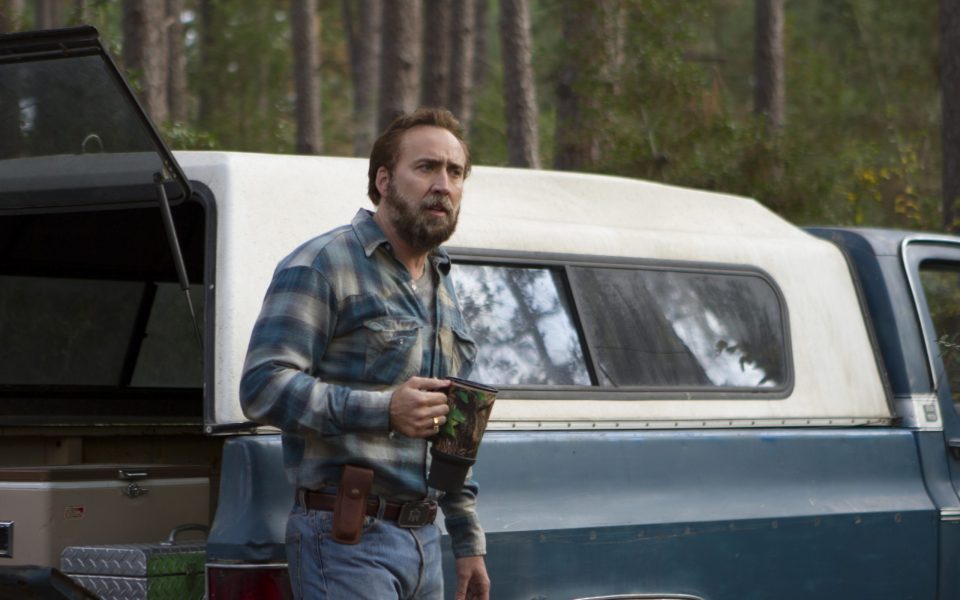by Brian Clarey
2014 was the year I ceded the food beat to Eric Ginsburg, who was anxious to dive in, and picked up the film and theater coverage, to which I’ve cast an eye on criticism and literary evaluation.
I’ve applied this blurry lens to subjects as varied as “Orange Is the New Black” and “Game of Thrones” to classic Japanese animation and Cannibal! The Musical, a seminal early work by Trey Parker and Matt Stone, of “South Park” fame.
But for the most part I’ve tried to keep it local, with mixed success.
Springtime was easy, with RiverRun International Film Festival providing enough material for 10 newspapers in its extended run.
I teased out a piece about Joe, the film based on a Larry Brown novel, starring Nicholas Cage and directed by UNC School of the Arts alum David Gordon Green. I was more interested in Brown, one of my favorite authors, and Gary Hawkins, who wrote the screenplay and had years earlier made a documentary, The Rough South of Larry Brown. I learned more about story and the film business — which are often mutually exclusive — over a banh mi lunch with Hawkins than I could have with a year of study.
Later in the year, a short film by RiverRun Executive Director Andrew Rodgers and Greensboro filmmaker Harvey Robinson called “Crooked Candy” began getting traction in the festival circuit, and will screen at some of the world’s most prestigious film fests by the time it’s finished its run. My cover story on these two old friends of mine was one of my favorites of the year.
In looking for independent, local and limited-release films, I found myself time and again turning to Geeksboro in Greensboro and A/perture Cinema in Winston-Salem, standard-bearers of independent film in their respective cities. One of the best I caught at A/perture was Frank, a genuinely odd story about a rock star who wore a giant fiberglass head all the time and describes his facial expressions out loud. I also enjoyed Point and Shoot, a documentary about Matt VanDyke, who left the Baltimore suburbs for a crash course in manhood to find himself fighting in the Libyan revolution and later imprisoned in Tripoli.
Of all the events at Geeksboro, the screening of the Japanese anime film My Neighbor Totoro ranks highest on the list, because though we only saw it just the one time, it now comes up at least once a week in my house.
The biggest film news of the year came when the state General Assembly decided to let the state film tax credits expire, essentially turning off the spigot to what was becoming a lucrative tool for economic development.
But ultimately, the year in Triad film belonged to “Fartzenegger,” a four-minute short comprised of nothing but quick cuts of iconic Arnold Schwarzenegger scenes with fart sounds added in. If it sounds stupid, that’s because it is, but it got picked up by the Onion AV Club, Gawker and even time.com and has attracted more than 1 million YouTube views because it’s hilarious, in an extremely juvenile sort of way. This one also comes up in discussion at my house a lot.
Midway through the year, we opened up the Screen section to include theater and dance, which it has been my privilege to cover thus far. Among the highlights were Triad Stage’s A Member of the Wedding, adapted by Carson McCullers from her novel, which I caught just as my son was studying To Kill a Mockingbird in school. The two stories, though told 15 years apart, are of a piece.
In Winston-Salem, I was fortunate enough to catch a performance of UNCSA’s annual production of The Nutcracker at the Stevens Center, this one with two featured dancers from the Boston Ballet dancing the roles of the Sugar Plum Fairy and her champion. The entire production, from the costumes and sets, to the lighting and choreography and the kinetic beauty of the dance itself, was captivating.
In the year ahead I’ll be looking to more theater, more local and independent film stories and whatever else emerges. In a perfect world, I’ll be able to ditch a week of work and spend the whole time at RiverRun, watching movies in the dark.
Join the First Amendment Society, a membership that goes directly to funding TCB‘s newsroom.
We believe that reporting can save the world.
The TCB First Amendment Society recognizes the vital role of a free, unfettered press with a bundling of local experiences designed to build community, and unique engagements with our newsroom that will help you understand, and shape, local journalism’s critical role in uplifting the people in our cities.
All revenue goes directly into the newsroom as reporters’ salaries and freelance commissions.


Leave a Reply